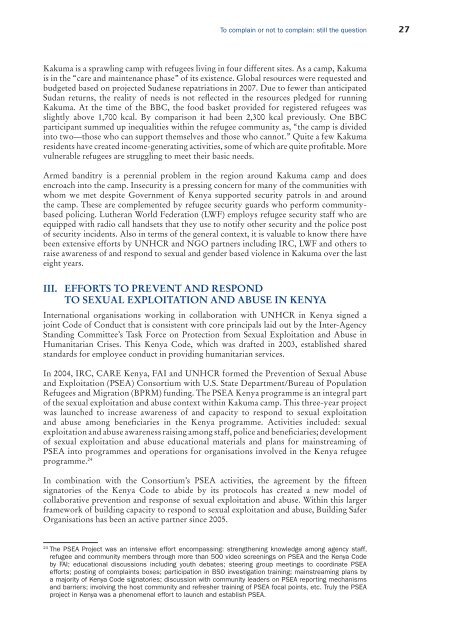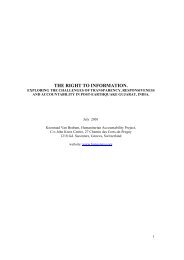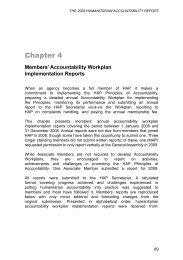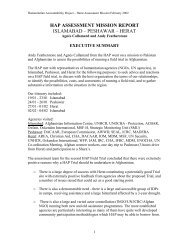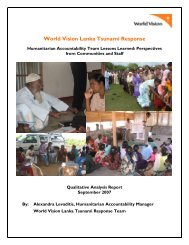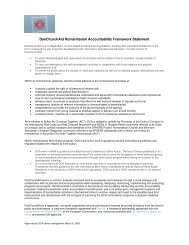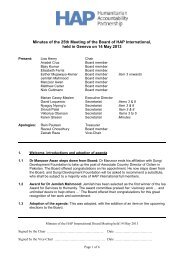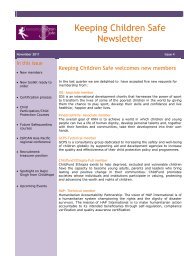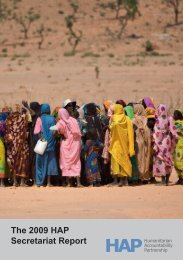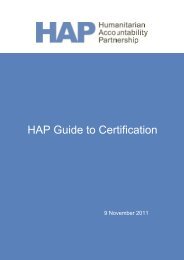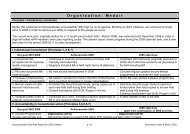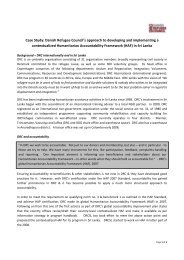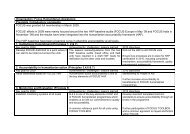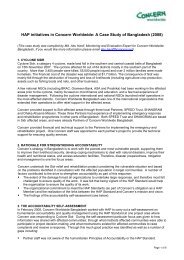TO COMPLAIN OR NOT TO COMPLAIN: STILL THE QUESTION ...
TO COMPLAIN OR NOT TO COMPLAIN: STILL THE QUESTION ...
TO COMPLAIN OR NOT TO COMPLAIN: STILL THE QUESTION ...
You also want an ePaper? Increase the reach of your titles
YUMPU automatically turns print PDFs into web optimized ePapers that Google loves.
To complain or not to complain: still the question<br />
27<br />
Kakuma is a sprawling camp with refugees living in four different sites. As a camp, Kakuma<br />
is in the “care and maintenance phase” of its existence. Global resources were requested and<br />
budgeted based on projected Sudanese repatriations in 2007. Due to fewer than anticipated<br />
Sudan returns, the reality of needs is not reflected in the resources pledged for running<br />
Kakuma. At the time of the BBC, the food basket provided for registered refugees was<br />
slightly above 1,700 kcal. By comparison it had been 2,300 kcal previously. One BBC<br />
participant summed up inequalities within the refugee community as, “the camp is divided<br />
into two—those who can support themselves and those who cannot.” Quite a few Kakuma<br />
residents have created income-generating activities, some of which are quite profitable. More<br />
vulnerable refugees are struggling to meet their basic needs.<br />
Armed banditry is a perennial problem in the region around Kakuma camp and does<br />
encroach into the camp. Insecurity is a pressing concern for many of the communities with<br />
whom we met despite Government of Kenya supported security patrols in and around<br />
the camp. These are complemented by refugee security guards who perform communitybased<br />
policing. Lutheran World Federation (LWF) employs refugee security staff who are<br />
equipped with radio call handsets that they use to notify other security and the police post<br />
of security incidents. Also in terms of the general context, it is valuable to know there have<br />
been extensive efforts by UNHCR and NGO partners including IRC, LWF and others to<br />
raise awareness of and respond to sexual and gender based violence in Kakuma over the last<br />
eight years.<br />
III. EFF<strong>OR</strong>TS <strong>TO</strong> PREVENT AND RESPOND<br />
<strong>TO</strong> SEXUAL EXPLOITATION AND ABUSE IN KENYA<br />
International organisations working in collaboration with UNHCR in Kenya signed a<br />
joint Code of Conduct that is consistent with core principals laid out by the Inter-Agency<br />
Standing Committee’s Task Force on Protection from Sexual Exploitation and Abuse in<br />
Humanitarian Crises. This Kenya Code, which was drafted in 2003, established shared<br />
standards for employee conduct in providing humanitarian services.<br />
In 2004, IRC, CARE Kenya, FAI and UNHCR formed the Prevention of Sexual Abuse<br />
and Exploitation (PSEA) Consortium with U.S. State Department/Bureau of Population<br />
Refugees and Migration (BPRM) funding. The PSEA Kenya programme is an integral part<br />
of the sexual exploitation and abuse context within Kakuma camp. This three-year project<br />
was launched to increase awareness of and capacity to respond to sexual exploitation<br />
and abuse among beneficiaries in the Kenya programme. Activities included: sexual<br />
exploitation and abuse awareness raising among staff, police and beneficiaries; development<br />
of sexual exploitation and abuse educational materials and plans for mainstreaming of<br />
PSEA into programmes and operations for organisations involved in the Kenya refugee<br />
programme. 24<br />
In combination with the Consortium’s PSEA activities, the agreement by the fifteen<br />
signatories of the Kenya Code to abide by its protocols has created a new model of<br />
collaborative prevention and response of sexual exploitation and abuse. Within this larger<br />
framework of building capacity to respond to sexual exploitation and abuse, Building Safer<br />
Organisations has been an active partner since 2005.<br />
24<br />
The PSEA Project was an intensive effort encompassing: strengthening knowledge among agency staff,<br />
refugee and community members through more than 500 video screenings on PSEA and the Kenya Code<br />
by FAI; educational discussions including youth debates; steering group meetings to coordinate PSEA<br />
efforts; posting of complaints boxes; participation in BSO investigation training; mainstreaming plans by<br />
a majority of Kenya Code signatories; discussion with community leaders on PSEA reporting mechanisms<br />
and barriers; involving the host community and refresher training of PSEA focal points, etc. Truly the PSEA<br />
project in Kenya was a phenomenal effort to launch and establish PSEA.


